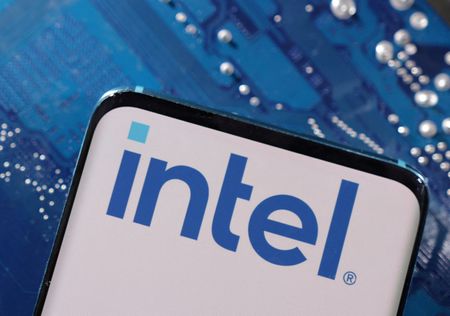By Arsheeya Bajwa
(Reuters) – Intel was one of the first two tech companies to join the Dow Jones Industrial Average during 1999’s dot-com era, along with Microsoft. Now, a slump in its share price could cost the American chipmaker its place in the blue-chip index.
Analysts and investors said Intel was likely to be removed from the Dow, pointing to a near 60% decline in the company’s shares this year that has made it the worst performer on the index and left it with the lowest stock price on the price-weighted Dow.
A removal will hurt Intel’s already bruised reputation. The company has missed out on the artificial intelligence boom after passing on an OpenAI investment and losses are mounting at the contract manufacturing unit that the chipmaker has been building out in hopes of challenging TSMC.
To fund a turnaround, Intel suspended dividend and announced layoffs affecting 15% of its workforce during its earnings report last month. But some analysts and a former board member believe the moves might be too little, too late for the chipmaker.
“Intel being removed was likely a long time coming,” said Ryan Detrick, chief market strategist at the Carson Group.
The latest results may be the final push needed to finally see the company removed from the Dow, Detrick added.
S&P Dow Jones Indices, which manages the Dow, declined to comment on whether Intel could be removed from the index.
Changes to the index are made as needed and the last update happened in February when struggling pharmacy chain Walgreens Boots Alliance was replaced by Amazon.com.
Stock price is a key element for inclusion in the Dow, unlike the S&P 500 index which takes into account market value.
The Dow’s selection committee monitors whether the highest-priced stock in the index has a price more than 10 times that of the lowest. Currently, the highest weighted stock – UnitedHealth Group – is priced about 29 times higher than Intel.
The chipmaker is also the least influential member of the index with a meager 0.32% weightage based on its closing price of $20.13 on Aug. 29.
While the larger impact would be to Intel’s reputation, the exclusion would further hit its shares, which are down more than 70% from a record high in August 2000, leaving the chipmaker with a market value below $100 billion for the first time in 30 years.
WHO WOULD REPLACE INTEL?
Nvidia could replace Intel on the Dow, according to Ryuta Makino, research analyst at Intel investor Gabelli Funds.
With shares up more than 160% this year, Nvidia has become one of the world’s most valuable firms thanks to the essential role its chips play in powering generative AI. A stock split in May also increased the odds of its inclusion.
But some investors said Nvidia might be too volatile a stock for the Dow, which usually prefers more stable stocks.
Texas Instruments, a nearly century-old chipmaker with significant production capacity within the United States, is another option to replace Intel in the index, said Daniel Morgan, senior portfolio manager at Synovus Trust, which owns shares in Intel.
Texas Instruments’ shares have risen more than 20% this year to $211.09 as of Thursday, which is closer to the Dow constituents’ average price of about $209.
In the event of a removal, a stock with a price closer to the average price of the current list might be preferred as a replacement, said David Blitzer, who chaired the S&P Dow Jones Indices’ Index Committee for more than two decades until 2019.
(Reporting by Arsheeya Bajwa in Bengaluru; Editing by Shounak Dasgupta)





